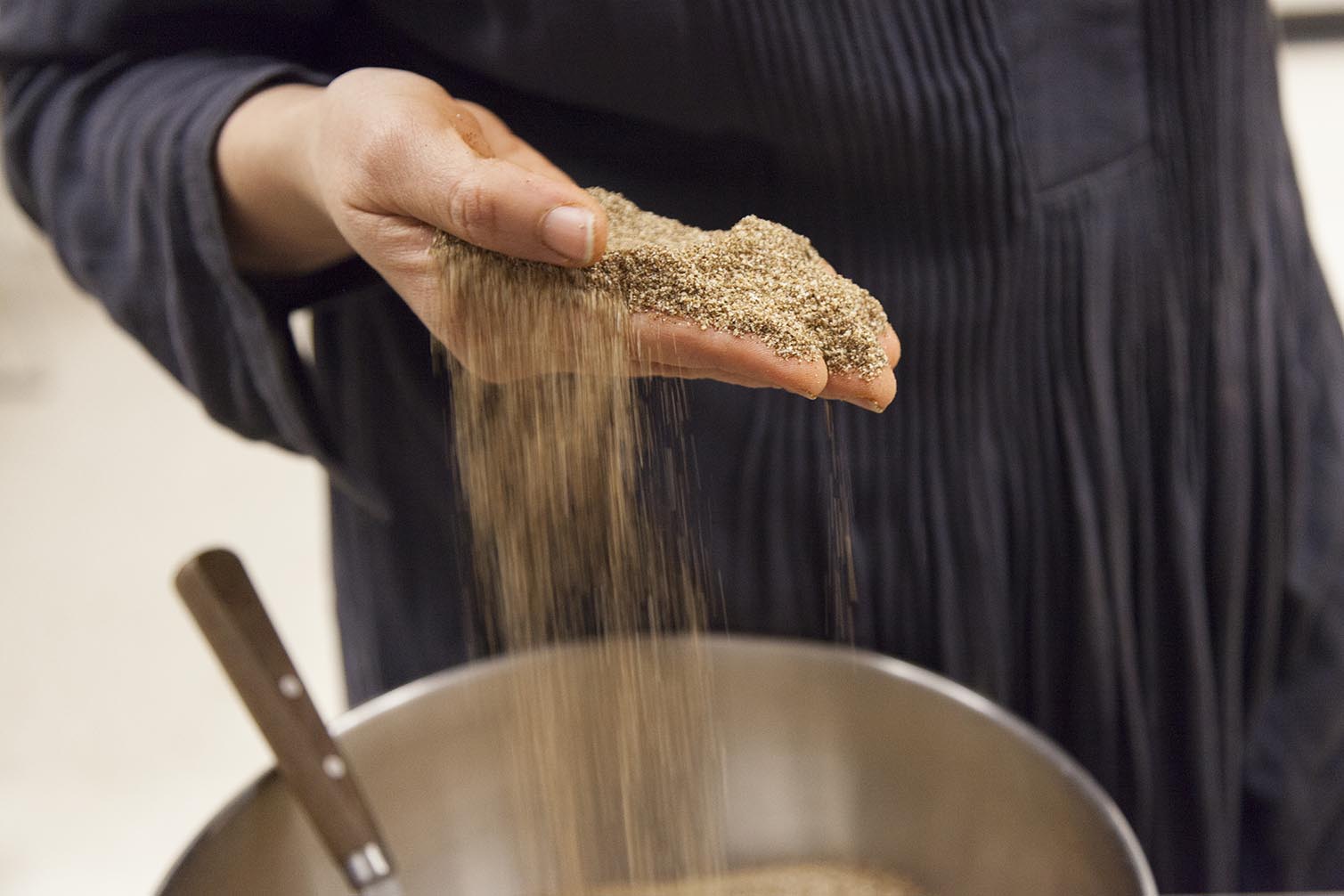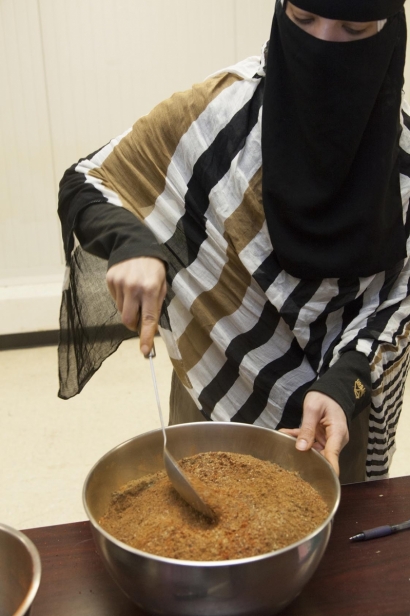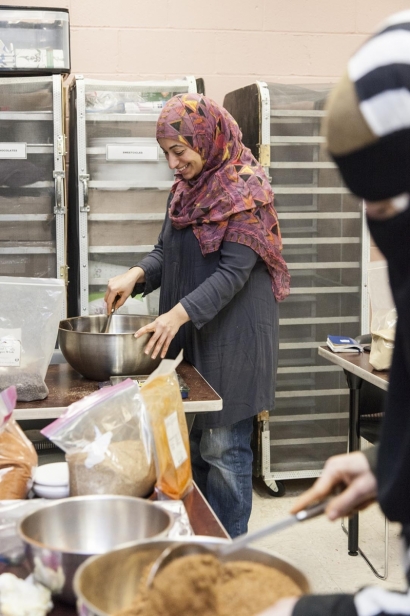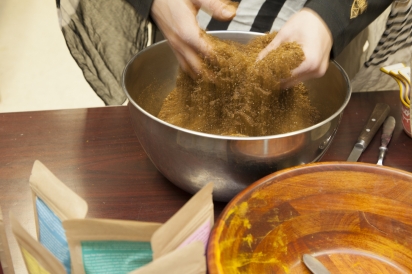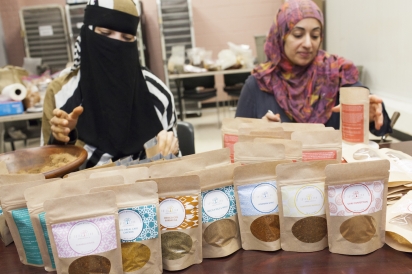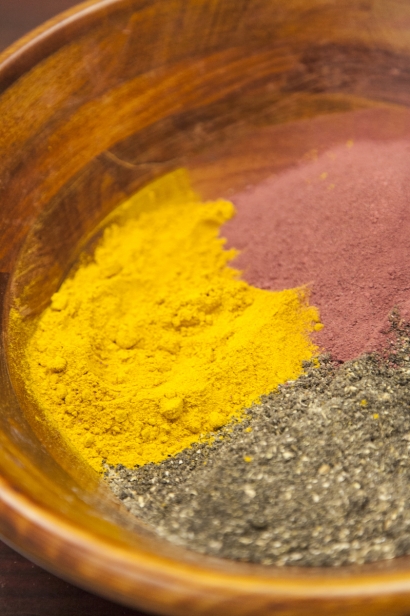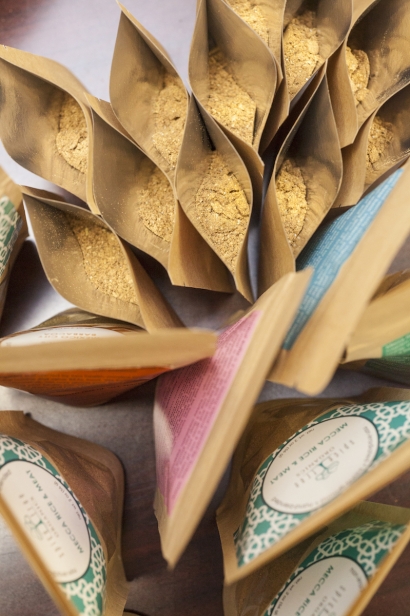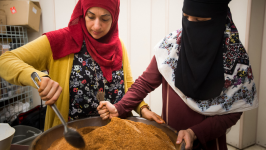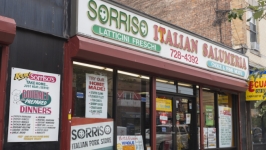Spice Tree’s Roots Stretch Around the World
Doaa Elkady and Freda Nokaly of Spice Tree Organics deftly anticipate each other’s movements as they transfer falafels from a sizzling oil bath, slice pitas and spoon homemade pickled cauliflower into a bowl.
As their children drop toys and homework to surround the table, they spread out lunch. Each dish incorporates one of Spice Tree’s handcrafted blends. Istanbuli kofta lends subtle Maras pepper heat to roasted eggplant salad while sumac-laced Beiruti za’atar adds citrusy lightness to thick, olive-oil-drizzled labneh. They make it look easy to feed a crowd, and with their line of spice blends and accompanying recipes they aim to empower other busy families to cook nutritious, flavorful meals with the same confidence.
Daughters of Egyptian immigrant home cooks, sisters-in-law Elkady and Nokaly were never strangers to spice. Growing up in Rego Park and Sunnyside they absorbed the flavors of their international neighborhoods—Moroccan ras el hanout, Indian chai, Greek gyro seasoning, Mexican barbacoa. All eventually joined Spice Tree’s catalog of 15 organic, small-batch, non-irradiated blends, whose boldly flavored bestseller is named for a hometown fixture: NYC Halal Cart Chicken.
They developed many of the blends years back, after learning that conventional spices were often treated with pesticides and sterilized with radiation or fumigation, while pre-made blends contained additives like MSG, artificial colors and anti-caking agents.
“Dude,” Nokaly remembers thinking, “we’re paying all this money for grass-fed meat and dumping toxic spices on it?”
The decision to turn grinding and blending into a business owed to timing, and belief in many forms. Having left jobs in journalism and civil engineering to raise children, Elkady and Nokaly were contemplating second careers just as maker culture exploded.
“It flipped the switch for us, going to Smorgasburg and seeing it so packed,” Elkady remembers. “That made us feel like there was space for us in the artisan movement.”
They believed their blends offered a winning combination: convenience, superior taste and potent health benefits. Islamic prophetic tradition taught them the healing power of spices like nigella and fenugreek, and their faith inspired them to share their product in peak form: organic, steam-sterilized, freshly ground.
“As Muslims, we’re taught to give people the best of what you have,” Elkady explained. This principle, ihsan in Arabic, also provided sound advice for getting a business off the ground: “Do everything to the best of your ability,” Nokaly translates. “Basically, don’t do things half-assed.”
In late 2015, they started small, obtaining a home processor license exemption that allowed them to work from their kitchens and sell locally at CSAs and food fairs. Needing a commercial kitchen if they wanted to sell online and out of state, they partnered with Entrepreneur Space, a Long Island City food business incubator offering consultations on everything from pricing to operating costs to packaging. Such considerations, Nokaly stresses, were critical:
“No matter how excited you are, or how much of an awesome product you think you have, if it doesn’t work financially, don’t do it. You’re just delaying failure.”
This past year brought Spice Tree to food events like Williamsburg Eats and Meatpacking MKT, pop-ups at West Elm Dumbo and Williams-Sonoma and online retailers including Hatchery and Many Kitchens. Through it all, their personal support system was crucial: the friends who assembled 7,000 samples in exchange for brunch, the husband who made an 11th-hour trek to an organic spice shop for an ingredient that ran out mid-order.
“When you become a mom and feel you’ve sacrificed a career or this or that, it’s easy to become resentful,” Elkady says, “and my husband was always, like, ‘I never want you to reach that point ... If you have something you want to do, I want to help you do it.’ I can’t quantify how much that means.”
On Spice Tree’s Instagram, two hashtags often appear side-by-side: #creativemuslimwomen and #girlboss. Elkady and Nokaly are well aware that their very presence can challenge preconceptions about both Islam and female ambition. “I veil my face outside,” Elkady says. “Sometimes you wonder how people will perceive that—are they still going to want to come talk to me? But they can feel through everything that you’re passionate, knowledgeable and committed—that you care for them.”
For her and Nokaly, the most powerful fulfillment comes in the form of customers reflecting that positive energy back: A mom of five texts to say her entire family devoured their Halal Cart Chicken recipe; a customer from a pop-up emails to offer post-election solidarity.
According to Nokaly, those moments of connection transcend sales figures: “We can all relate over food ... I’m successful already because I’ve changed people’s lives. I’ve made their lives easier. I’ve made their lives tastier ... I’m representing my religion and showing that we’re here to help you and we’re part of this society. The way you care about your kids and your family, I care about my kids and my family. And I also care about yours. We’re all in this together.”
Spice Tree Organics | @spicetreeorganics
Smorgasburg | @smorgasburg
West Elm Dumbo | @westelmdumbo
Williams-Sonoma | @williamssonoma
Many Kitchens | @manykitchens


